
Honoring Excellence in Safety and Service
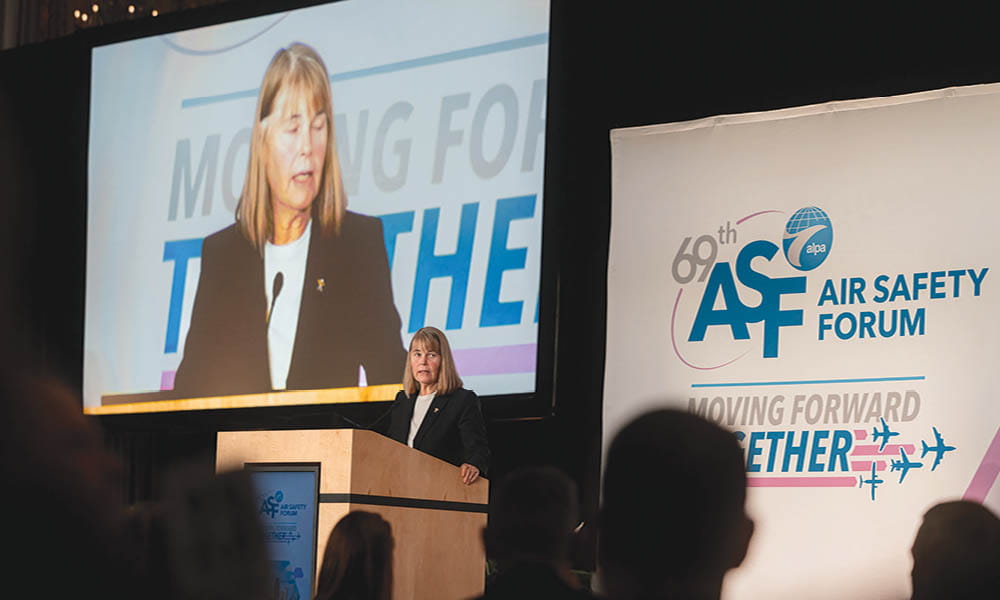
ALPA recognized its best and brightest in Chicago, Ill., on September 11 as the Association’s 69th Air Safety Forum awards banquet brought pilots, staff, and industry partners together. The banquet capped four days of meetings, panels, and technical sessions with a celebration of the Air Safety Organization’s (ASO) pilot volunteers, whose work advances aviation safety, aviation security, aviation jumpseat, and pilot assistance, and flight crews whose skill and professionalism under pressure safeguarded their passengers, crewmates, and aircraft.
The Chicago Hilton Grand Ballroom provided a fitting stage for the evening’s celebrations. The annual banquet reconnects pilots with longtime ALPA volunteer colleagues, as new volunteers reunite with their mentors, and families share in their pride of service. Capt. Wendy Morse, ALPA’s first vice president and national safety coordinator, welcomed the attendees.
“This evening, we celebrate airline pilots who’ve demonstrated the very highest standards of excellence,” Morse remarked. “We also pay tribute to ALPA pilots who embody courage and perseverance. Their resiliency and determination in the face of challenge have truly changed our union and our industry.”
Since 1957, when Capt. E.A. “Ernie” Cutrell received ALPA’s first Air Safety Award for pioneering a centerline approach lighting system, the banquet has served as a signature moment of the forum, honoring service, professionalism, and the unwavering commitment to safety that defines the union. Each year’s recognition of previous honorees in attendance underscores that tradition.
Morse welcomed a number of past ASO honorees and introduced special guests at the head table, along with four student aviators—Ellie Balose (Auburn University), Ezri Faivre (Middle Tennessee State University), Jackson McKinney (Auburn University), and Levi Weir (Embry-Riddle Aeronautical University). Their early leadership and flight experience reflect the profession’s bright future and underscore the banquet’s dual role of honoring the profession’s past and present while affirming its future. She also acknowledged the spouses, partners, and families whose support makes volunteer service possible, noting the late-night calls, schedule changes, and missed dinners that often accompany ASO work.
Superior Aviating Awards
Capt. Jason Ambrosi, ALPA’s president, took the stage to present awards to the Superior Aviating honorees. These awards honor flightcrew members who’ve demonstrated exceptional flying skills and judgment while performing their duties under challenging circumstances. This year’s honors were presented to the following pilots.
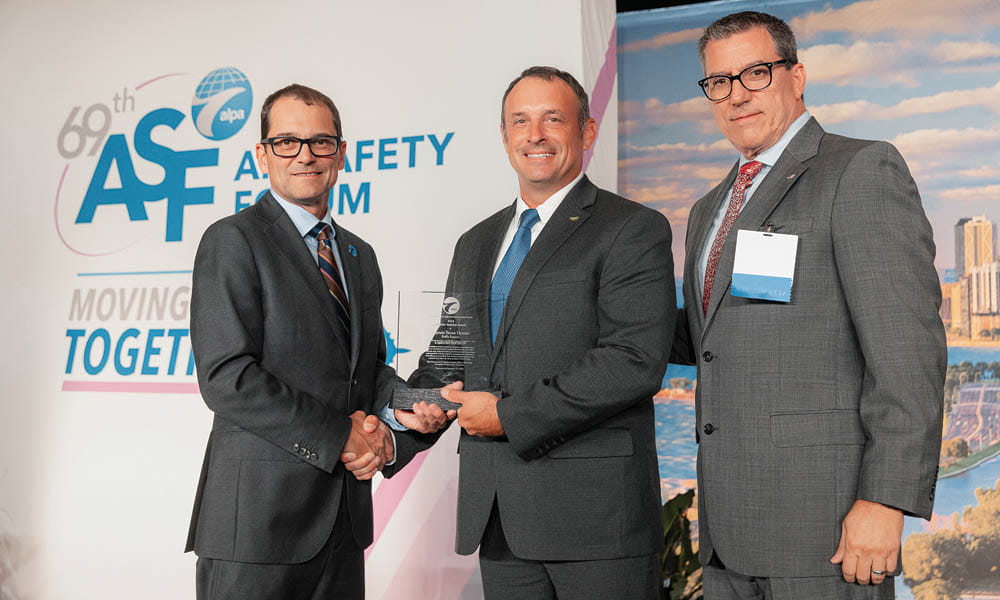
Capt. Bryan DeVries, F/O Richard Sumner, and F/O William Saupe
FedEx Express Flight 1376
On the morning of October 4, 2023, a Boeing B-757 departing Chattanooga, Tenn., for Memphis, Tenn., suffered a sudden loss of pressure in the left hydraulic system, which is responsible for operating the landing gear. Capt. Bryan DeVries and F/O Richard Sumner ran emergency checklists and enlisted F/O William Saupe, who was jumpseating, to coordinate with a FedEx Express B-757 tech pilot. Despite repeated attempts, the landing gear remained retracted. With no other options, the crew declared an emergency and prepared for a gear-up landing back at Chattanooga. The aircraft came to rest about 830 feet beyond the runway, and all three pilots exited without injury.
The NTSB later determined that the crew faced two compounding failures: a leak in the hydraulic hose connected to the landing gear system and a broken wire in the alternate gear extension system, leaving no means to deploy the gear. As Capt. José Nieves, the FedEx Master Executive Council (MEC) chair, noted, “When the unexpected happens, the safety of a flight rests in the training, judgment, and skill of at least two pilots on the flight deck of every airline flight.”
“There was no playbook for what we pulled off that night,” DeVries observed as he accepted the award for the crew. “And in the end, there was no checklist either. What we accomplished was a result of our experience levels and training. We didn’t ‘rise to the occasion,’ we fell to our training levels.” He added that the event underscores why “it’s critical that we as an industry maintain a multipilot flight deck. To think otherwise makes safety feel like nothing more than empty words that look good on a company poster.”
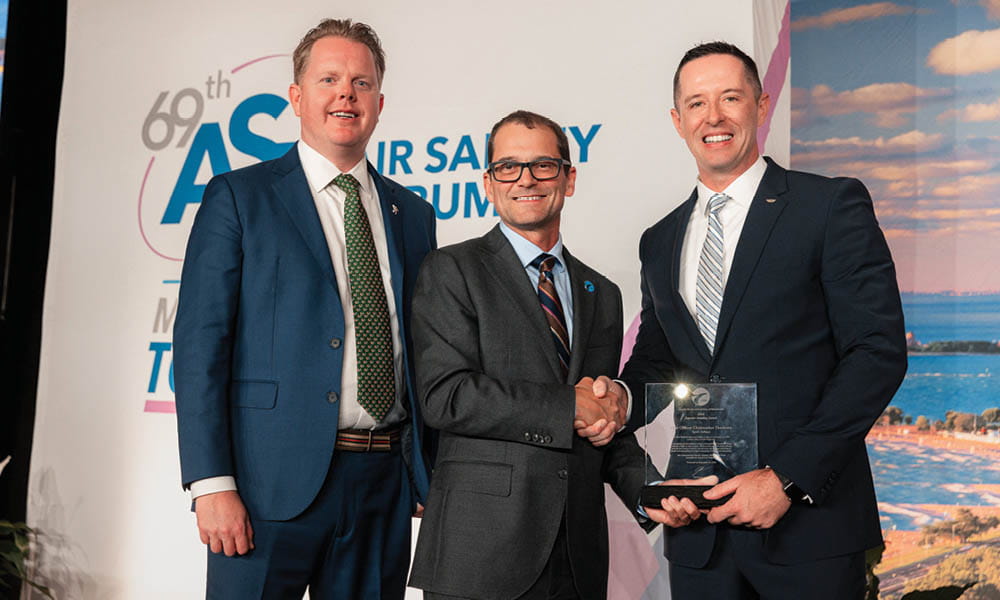
Capt. Juan Zuluaga and F/O Christopher Docherty
Spirit Airlines Flight 951
On Nov. 11, 2024, during final approach to Port-au-Prince, Haiti, gunfire struck a Spirit Airbus A320neo at roughly 500 feet above ground level. Six rounds hit the aircraft—one pierced the avionics bay causing depressurization; others damaged a hydraulic line, the fuel indication system, an engine nacelle, and the fuselage. With cascading alerts, an uncertain fuel state, and no normal braking, Capt. Juan Zuluaga and F/O Christopher Docherty rejected the approach, coordinated their action, and diverted to Santiago, Dominican Republic, where they landed safely. All passengers and crewmembers were able to walk away from the aircraft.
“In an instant, a routine approach became a life-threatening emergency,” said Capt. Ryan Muller, the Spirit MEC chair, who presented the award. “By working together—calm leadership and critical decision-making while literally under fire—they exemplified the very best of our profession.”
Accepting on behalf of the crew, Docherty emphasized the importance of support after the incident. “The first call I received was from our Critical Incident Response Program chair. He was an amazing resource I relied on for weeks. That support, along with the work of FOQA, my colleagues, and my family, was truly helpful in processing what happened.” He added, “Having two pilots on the flight deck on this day was why we were able to safely complete this flight. And I thank all of you who are still working to ensure that doesn’t change.”
“These flight crews—with two or more pilots on each flight deck—combined their expertise and decision-making to ensure a safe outcome with no loss of life,” Ambrosi remarked. “Without two or more pilots, the results may have been very different. ALPA will always promote the need for at least two pilots on the flight deck at all times on every airline flight. That’s nonnegotiable.”
Air Safety Organization Annual Awards
Four ALPA volunteers were recognized with ASO annual awards for outstanding service in their disciplines. Morse presented these awards along with each of the ASO group chairs.
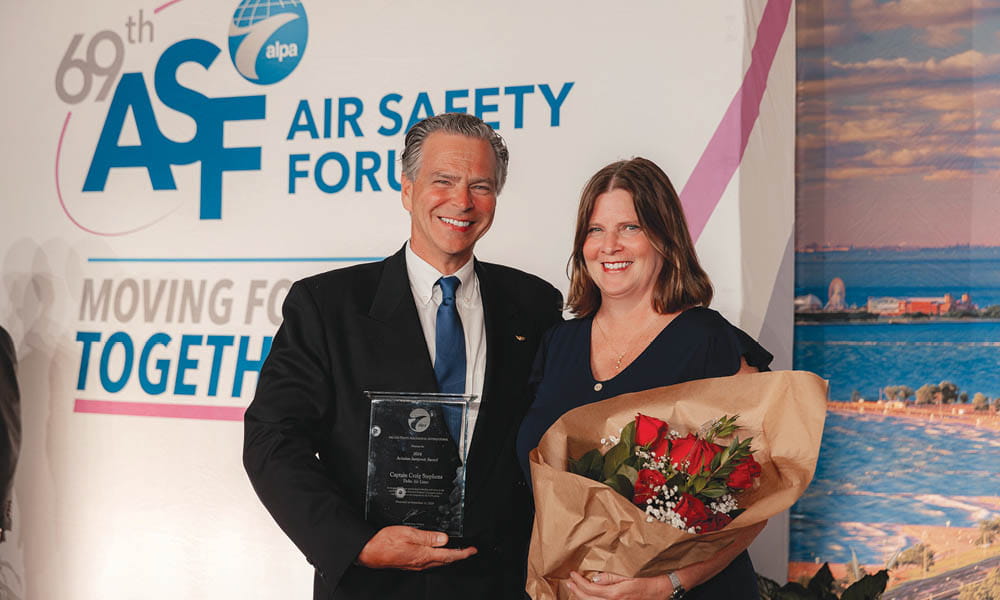
Aviation Jumpseat Award
Capt. Craig Stephens (Delta)
A founding member of ALPA’s national Jumpseat Committee and the Association’s original international jumpseat subject-matter expert, Capt. Craig Stephens (Delta) helped shape the program’s mission and built its first dedicated website, strengthening communication, standards, and access for pilots systemwide.
“As I approach the end of my career, it becomes even more important for me to encourage you as volunteers to identify, to recruit, and to equip your successors,” Stephens commented. “You don’t know what steps you’re taking today that will bear fruit far into the future.” He acknowledged the student aviators in the room saying, “We have four young people right here pursuing their careers, who may one day be up here because of the work they’ve done supporting pilots in whatever new thing is on the horizon that will change our industry.” But mostly, Stephens said he wanted to thank everyone for the opportunity to serve.
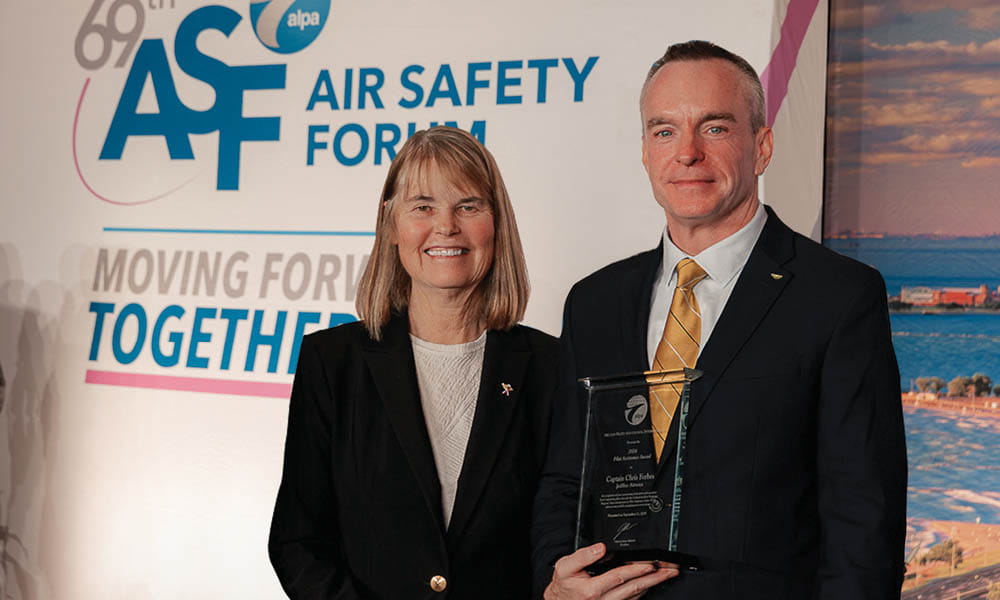
Pilot Assistance Award
Capt. Chris Forbes (JetBlue)
A dedicated Critical Incident Response Program volunteer, Capt. Chris Forbes (JetBlue) has provided reliable, compassionate support following stressful events, and invested countless hours in supporting the needs of ALPA pilots.
“It’s an honor to be up here receiving this Pilot Assistance Award,” Forbes stated. “Most importantly, I’d like to thank everybody who does ALPA volunteer work. I’m just one of probably hundreds of people who do this work.” He also expressed appreciation for the support of his wife, who’s often made adjustments when duty called. “She knows the drill. I’ll put my AirPods in and make a call. It may only be 10 minutes. It may be an hour.”
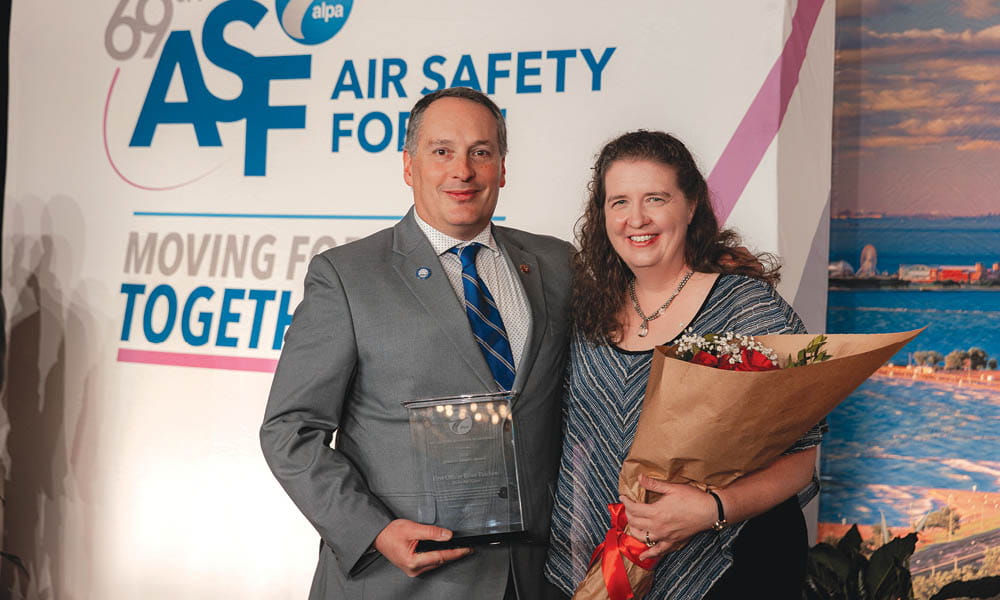
Aviation Security Award
F/O Bryan Patchen (Delta)
Following the Oct. 7, 2023, attacks in Israel, F/O Bryan Patchen (Delta) coordinated the safe extraction of Delta and FedEx Express crews and families from Tel Aviv, leveraging in-country government contacts and El Al. He also improved security information sharing across ALPA, including member access to the Factal real-time alerting platform.
“I’m looking around and seeing all the fancy watches and shiny jewelry. Please don’t take those on layovers,” Patchen quipped as he took the stage. “I’d like to start by thanking my wife because she tolerates all of this important ALPA work that we do. Nobody ever calls a security guy when they’re having a good day. So the calls never come at a good time, but I’m always able to remove myself and make sure that we take care of our pilots. There’s a lot of overlap between the safety and security worlds. We’re not separated. We’ve got GPS jamming, we’ve got lasers, we’ve got cyber, and all that stuff interacts and overlaps. For everybody up here on the stage tonight, there are hundreds more ALPA folks out there doing the job and keeping everyone safe. So thanks again and leave those watches at home please.”
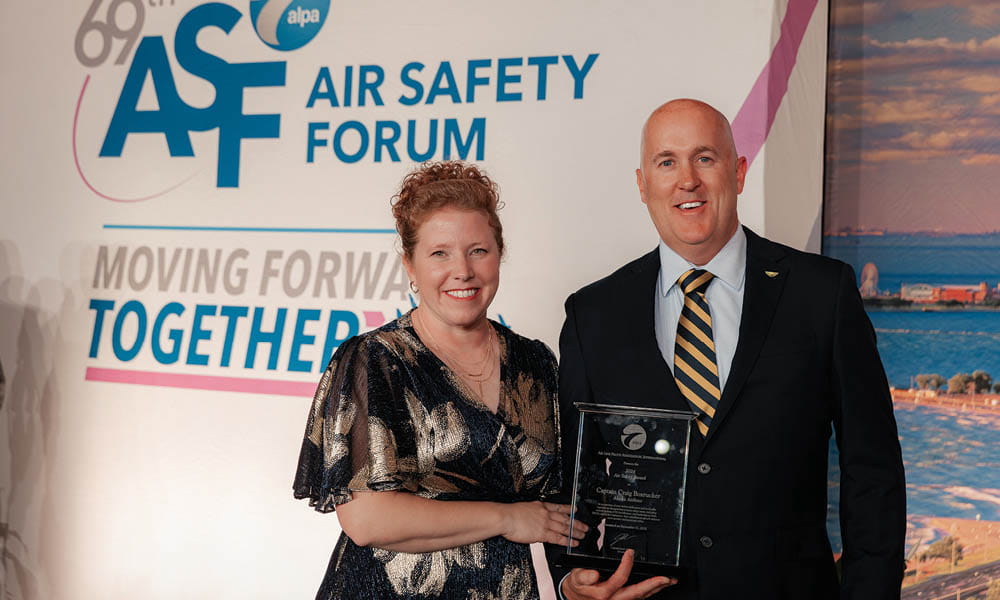
Air Safety Award
Capt. Craig Boxrucker (Alaska)
Recognized for years of volunteer leadership and broad technical expertise, Capt. Craig Boxrucker (Alaska) played a key role in assessing 5G impacts on critical aircraft systems. He serves as a subject-matter expert across the FAA, the RTCA, the International Civil Aviation Organization, and other standards bodies, consistently driving meaningful safety improvements.
“When I first received the phone call about this award, my first thought was that I had done something wrong. It wasn’t on my radar at all,” said Boxrucker. “I’m usually the guy who’s behind the scenes trying to do organizational work and that sort of thing, and this wasn’t at all what I thought was going to happen. So I appreciate this very much.” He thanked colleagues and especially his wife. “She’s been there to usher the kids, the dogs, and everyone else out of the room when I’m on conference calls and when other things come up. She’s got her own career as a NICU nurse. So many nights, she would come home truly wiped out, but she would still be there for me. So again, this was a surprise. I’m truly honored. Thank you for this recognition.”
Presidential Citations and Airport of the Year Award
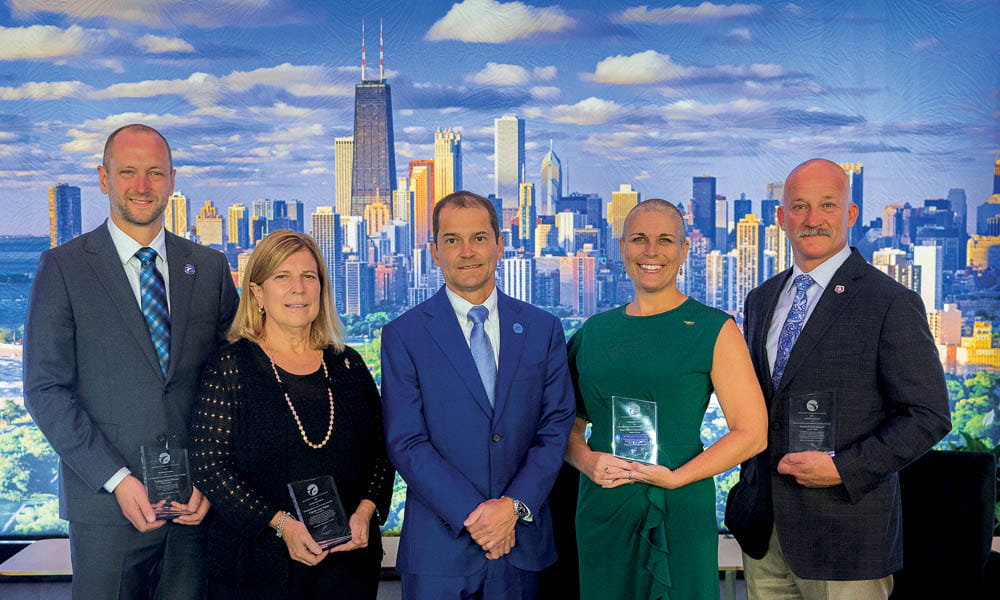
Additional awards were presented on Wednesday morning, September 10, as the Air Safety Forum’s private-day sessions came to a close. Capt. Jason Ambrosi, ALPA’s president, presented Presidential Citations for exceptional ASO service to
- Capt. Ana Vegega (United) for leadership in developing and implementing Safety Management Systems.
- Capt. Kurt Schuster (JetBlue) for leadership and innovation in aviation security.
- F/O Nachelle White (Cargojet) for transformative work advancing pilot assistance programs.
- Capt. Justin Klassen (WestJet) for dedication to strengthening and expanding jumpseat access in Canada.
“The honorees recognized today join a cadre of ALPA members who reflect the very highest caliber of excellence in our profession and our industry,” noted Ambrosi. “They’re among the finest examples of the spirit of volunteerism and service to the profession.”
Ambrosi also presented the Association’s Airport of the Year Award to Calgary International Airport, recognizing its strong collaboration with pilots and commitment to operational safety. Calgary has distinguished itself through consistent engagement with ALPA’s Airport Safety Liaison program and active participation in the Local Runway Safety Team.
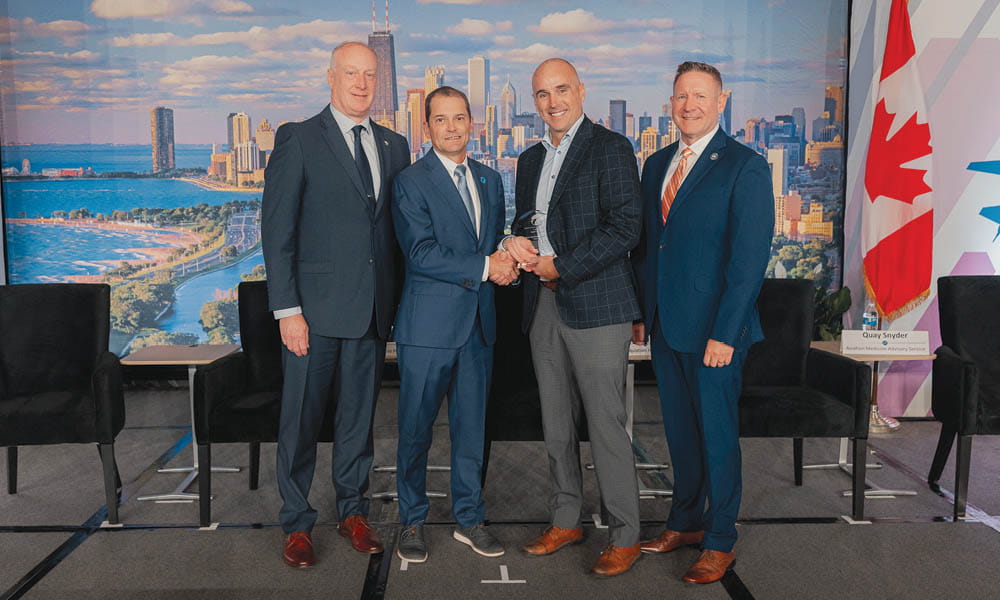
“Airport leadership in Calgary has demonstrated that they view pilots not just as operators, but as partners in safety,” Ambrosi remarked. “That willingness to collaborate has made a measurable difference for flight operations, and it reflects exactly the kind of relationship we seek to build at airports across North America.”
Banquet Illuminates ALPA Priorities
While the Air Safety Forum banquet is first and foremost a celebration of pilots and their contributions, it also provides ALPA with an opportunity to spotlight policy debates that shape the future of aviation safety and security. The awards shine a light on individual and collective achievements, but the event also underscores the critical issues that the Association continues to champion with lawmakers, at regulatory agencies, and in industry working groups.
One such priority is the ongoing effort to oppose reduced-crew operations. Airlines and manufacturers are actively attempting to advance concepts for single-pilot or reduced-crew airline operations, citing cost savings and the benefits of using the highest levels of automation. But the stories of this year’s Superior Aviating Award recipients tell a very different narrative. Whether handling cascading system failures or responding to a hostile act from outside the aircraft, the presence of at least two trained pilots working together on the flight deck made the difference between disaster and a safe landing. ALPA leaders reiterated to banquet attendees that reducing the number of pilots on the flight deck isn’t a matter of innovation, but of unacceptable risk.
Another area of focus is the implementation of secondary flight deck barriers. Nearly 25 years after 9/11, ALPA continues to press for consistent and effective protection during flight deck door openings. While legislation mandating secondary barriers has been enacted, ALPA remains engaged to ensure that the FAA fully implements the rules required by law and enforces these requirements across the industry. The forum provided a platform for pilots to connect with policy makers and industry stakeholders, reinforcing that flight deck security can’t be compromised or delayed.
The evening also highlighted the ongoing importance of pilot mental health and ALPA’s Pilot Assistance programs, including the Critical Incident Response Program and Pilot Peer Support. The remarks of award recipients Docherty and Forbes illustrated the life-changing impact of these resources. Their stories affirmed why ALPA continues to advocate for confidential support systems, destigmatizing mental-health conversations, and ensuring pilots can access care without fear of career repercussions. The September 9 passage of the Mental Health in Aviation Act in the U.S. House of Representatives was a significant milestone, but ALPA’s work continues to guarantee effective implementation and meaningful protection.
International jumpseating is another policy priority that found a spotlight during the banquet. The ASO’s Aviation Jumpseat Group pilot volunteers have devoted years of advocacy to expanding access to and addressing the unique complexities of transborder travel. ALPA leaders have emphasized that ensuring equitable, secure, and reliable access to jumpseats worldwide is both a quality-of-life issue and a matter of safety.
In weaving these advocacy themes into the fabric of the awards banquet, ALPA reminded members and partners alike that the evening isn’t only a recognition of what’s been achieved, but also a call to action on the challenges that remain. From the dangers of reduced-crew operations to the urgency of secondary barriers, from safeguarding mental health to defending international jumpseat rights, the Association used this stage to emphasize that pilot voices must be central in shaping aviation policy.
“Every award we present tonight tells a story,” said Morse. “And each story points to a larger truth: that aviation safety and security require constant vigilance, advocacy, and the collective effort of pilots standing together.”
More from the 69th Air Safety Forum
More than 600 individuals came together to collaborate, network, and continue the work of making the safest form of transportation in North America even safer.
The Air Safety Forum kicked off with private meetings of the various councils, committees, and groups that support the ASO's four pillars: Safety, Security, Pilot Assistance, and Jumpseat.
Falling on the 24th anniversary of the September 11 terrorist attacks, the Air Safety Forum served as a reminder that the Association's safety work is never done.












